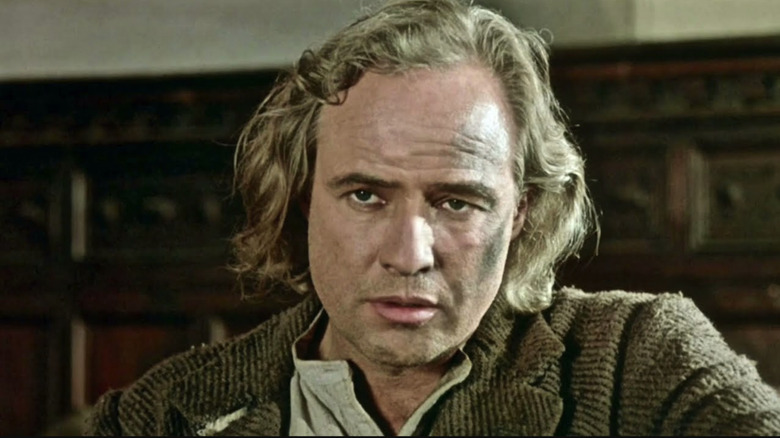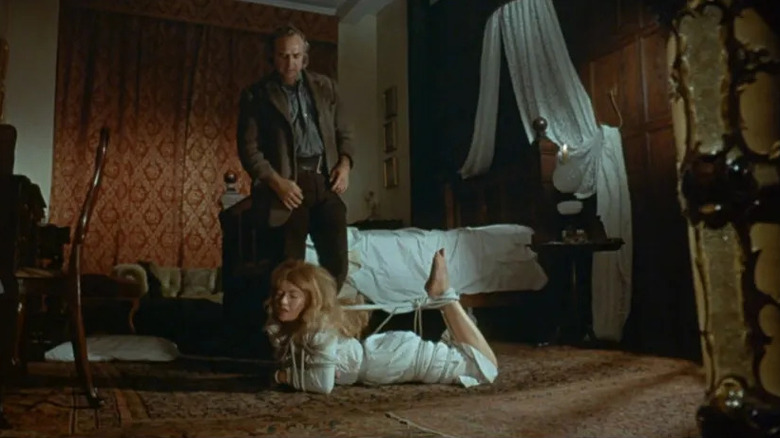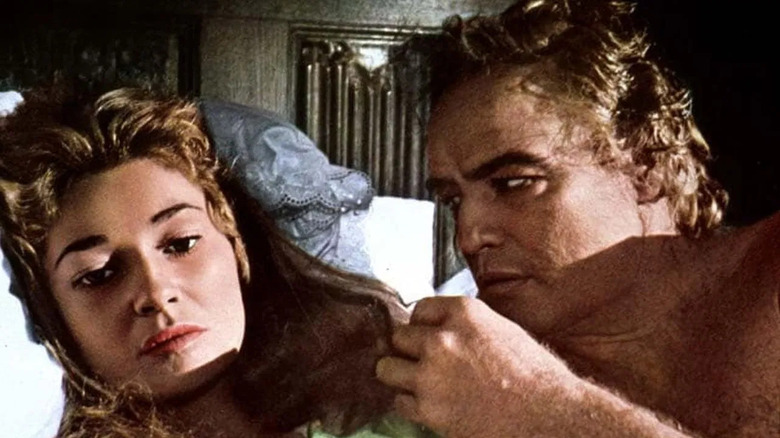Marlon Brando's Forgotten Horror Movie Was Only Profitable For One Reason
The notion that sex and violence are primarily what sells has been a long-standing axiom in numerous industries, but particularly in entertainment. Human beings are inexorably drawn to the darker side of life and wish to have experiences that safely allow them to indulge in these concepts and feelings. Yet censorship has always existed in the arts for a variety of reasons, which are too complex and culturally varied to go into here. Suffice it to say that artists have always found clever ways of subverting and getting around such restrictions. This is why, when watching a film that was made in America during the Hays Production Code, you can often find moments and themes that are incredibly clever in how they handle risqué elements, the better to fool the censors but not the audience.
Eventually, of course, the Hays Code fell apart, ushering in the era of the Motion Picture Association of America (which has been shortened these days to just MPA) at the end of the 1960s. The rating system allowed for films to be made with heavily explicit adult content, and thanks to the prior 30-odd years under the Production Code, the dam for adult content really began to burst during the 1970s. Artists were delighted to be able to express themselves much more freely, and audiences became enthralled with the increasingly hip, daring, and lurid films that began to be released. Sure enough, this wave of cinema saw filmmakers and exhibitors realize that sex and violence could now sell even more than ever before, as such content had the added bonus of seeming bold and new.
One filmmaker who discovered this change in real time was Michael Winner, a London-born director who gained a reputation during the latter half of his career for making particularly unsavory exploitation genre films, especially the "Death Wish" series. In 1971, Winner made "The Nightcomers," a horror movie that acted as a prequel to Henry James' novella "The Turn of the Screw." The unusual take on the source material, plus the involvement of star Marlon Brando, was not enough to be a huge draw, however, at least not according to Winner, who maintained that the reason for the film's modest profitability was its sexual and violent content.
Winner saw his films needing lurid content to be successful
The films of Michael Winner are amongst those that can be argued to be filled with sexual and violent content that is unequivocally gratuitous. Yet such arguments fail to take into account the entire point and appeal of the exploitation film, a category which Winner's work easily falls into. Sure, the sex and violence may not be explicitly necessary to tell the story, but in the case of an exploitation movie, the sex and violence are the story, or are at least intentionally contributing to the tone and style of the film. Throughout his career (again, especially when it came to the "Death Wish" films), Winner was accused at various times of being a little too into his subject matter, and his outspoken nature did him no favors. A member of the Conservative Party (the Tories) and supporter of Margaret Thatcher, he was also someone who had liberal views on queer rights at the time. As such, his moral and political intentions in including so much lurid material in his movies weren't so easily defined.
His artistic intentions were, however, easily explained, and by Winner himself, too. In an interview with The New York Times around the production of "Death Wish II," Winner came across as entirely pragmatic and practical about the subject of sex and violence in his cinema, and used "The Nightcomers" as an example:
"Pictures I've made with sex and violence have done very well; pictures I've made without them have done rather poorly. It's as simple as that. Even when we did 'The Nightcomers,' with Brando, which won a few festivals, it was only the sex and violence that made it profitable. It was rather an intellectual piece, but without the violence it would have gone nowhere at all.”
It's a point of view most of us are used to nowadays — witness Quentin Tarantino's "Because it's so much fun, Jan!" soundbite regarding violence in his films, for example. When speaking to the 1970s establishment that had grown up with much less permissiveness in their media, however, Winner tried to underline the fact that sex and violence were merely outselling intellectualism, and that he was merely going where the action was (literally):
"Now, of course, they say I've sold out. 'This intelligent man who made these marvelous films has become a brute who makes blood-and-thunder pictures.' And I say, actually, I'm the same. The pictures have changed because the public didn't buy the ones I wanted to make. So my choice was to take up gardening, or to apply my craft as best I could.”
'The Nightcomers' actually did need its sex and violence
What Winner didn't explain in that NYT interview is that he was still being very intelligent in choosing the stories and subject matter for his films, picking topics that would not just allow but require sexual and violent material. Sure, "Death Wish" and its sequels go gleefully over the top, but the story of a rage-filled vigilante is very suited to moments of extreme violence. If "The Nightcomers" were a straightforward adaptation of James' novella, telling the same story of a governess tending to disturbed children who may be interacting with the spirits of their dead gardener and prior governess, its sex and violence may have indeed been labeled gratuitous. After all, Jack Clayton had proved with his adaptation of James' "The Innocents" that the story could be immensely powerful (and even subversive) through cinematic suggestion ten years prior.
Yet Winner and screenwriter Michael Hastings did not wish to tell the same ghost story that James and Clayton told, but instead depict the psychosexual, sadomasochistic relationship between Peter Quint (Brando) and Miss Jessel (Stephanie Beacham) that allegedly occurred before the events of James' novella. As such, the sexual and violent aspects of the film are necessary to tell this story, especially as it relates to how the twisted relationship between the couple inexorably affected the two children of Bly Manor, Flora (Verna Harvey) and Miles (Christopher Ellis), who may not have been all that well-adjusted to begin with. Yes, while the story could've been told in a much more suggestive and classy way, it wouldn't have nearly the same amount of power that Winner's unobtrusive, unflinching camera gives it.
Winner may indeed have been accurate in chalking up the success of "The Nightcomers" to its racy material. Certainly, its connection to "Turn of the Screw" wasn't played up that much in its marketing, and even Brando's star power was at a low ebb at the time — his star was only a year away from rising again thanks to "The Godfather." Yet it's just as true that the content of the story matched its exploitative style, something that Winner must have inherently known, as his subsequent films prove. It's a shame that "The Nightcomers" has been so forgotten, as it easily ranks as one of the most intriguing and unusual adaptations of James' work. Perhaps now, after reading this, you might be enticed to seek it out.


